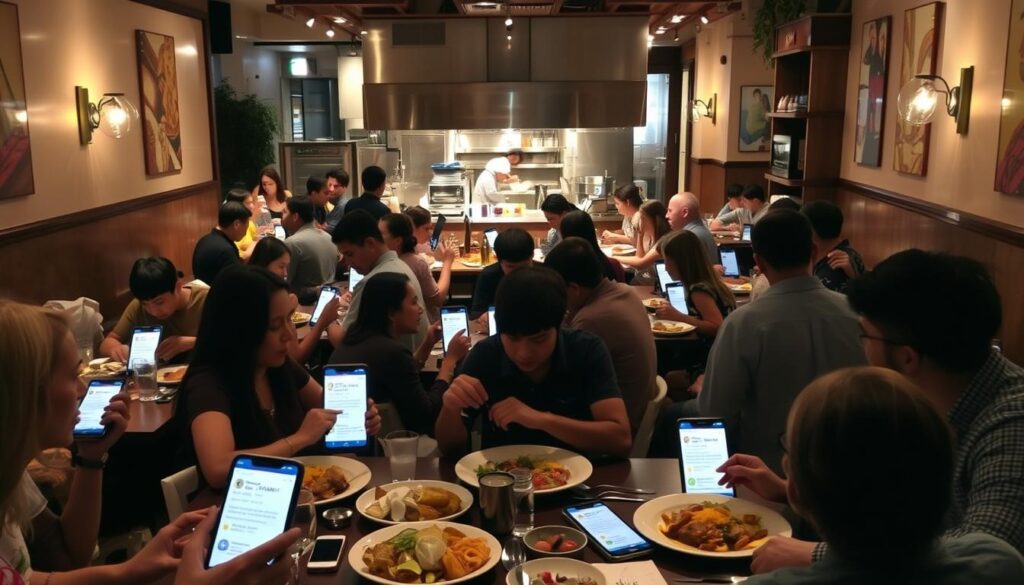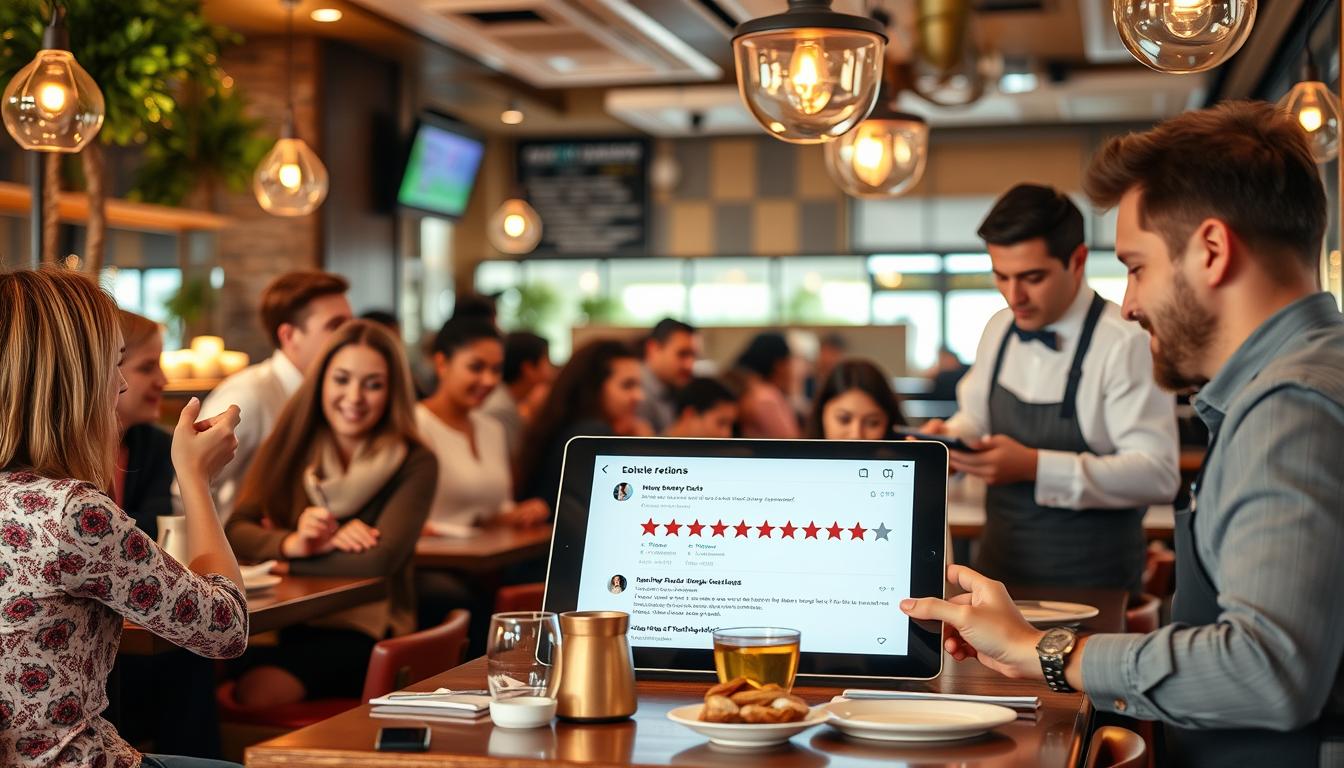Reputation management is key for restaurants today. Social media and review sites play a big role. Industry expert David “Rev” Ciancio says it’s as crucial as a great dining experience. By monitoring reviews, both good and bad, and responding quickly, restaurants stay popular.
Ask for a free consultation and discuss your restaurant’s reputation needs.
Restaurants can manage their reputation themselves, hire a digital manager, or use a third-party. They need to check social media and review sites, reply to feedback, and analyze what customers say. Managing reputation well can really help a restaurant’s success, with almost half of customers more likely to order after seeing positive reviews.
Online reviews greatly influence what customers choose. Restaurants must focus on their digital image and manage their reputation well. By using customer feedback wisely, they can draw in new customers, keep existing ones, and succeed in a tough market.
Understanding Restaurant Reputation Management Fundamentals
In today’s digital world, a restaurant’s online image is key to attracting and keeping customers. Proactive reputation management is vital for local eateries to keep a good image and build trust with customers.
Key Components of Digital Restaurant Presence
A good website is the base of a restaurant’s online image. It should also have profiles on sites like Yelp, Facebook, and Instagram. These platforms let customers find and share their experiences at the restaurant.
The Role of Customer Feedback in Brand Perception
Customer feedback, especially online reviews, greatly affects a restaurant’s image. In fact, 79% of guests trust online reviews as much as a personal recommendation. It’s important to watch and reply to feedback on Google, Yelp, and TripAdvisor to keep a good reputation.
Modern Platforms for Restaurant Reviews
Online review sites have changed how people find and choose places to eat. Restaurants need to manage their online presence well. Bad reviews can scare off customers, more than health warnings or negative word of mouth.
| Review Platform | Key Features | Impact on Reputation |
|---|---|---|
| Integrated with Google Maps, allowing customers to discover and review local restaurants | Positive reviews can boost search engine rankings and online visibility, while negative reviews can deter potential customers | |
| Yelp | Dedicated platform for customer reviews and ratings of local businesses, including restaurants | Yelp reviews can significantly influence customer decision-making, with increasing a restaurant’s rating by just one star leading to a 5-9% growth in revenue |
| TripAdvisor | Focuses on travel-related businesses, including restaurants, providing reviews and ratings from diners | Positive TripAdvisor reviews can boost a restaurant’s reputation, particularly for establishments in tourist-heavy areas |

To manage a restaurant’s online reputation well, you need to be proactive. This means watching review sites, responding quickly to feedback, and always trying to improve the dining experience.
The Power of Restaurant Reviews in Customer Decision Making
In today’s digital world, online reviews play a big role in where people choose to eat. A study found that 57% of people look at online reviews before deciding where to dine. This shows a big change in how people choose restaurants, moving from word-of-mouth to online advice.
Good reviews can really help a restaurant. About 46% of diners are more likely to go to a place with positive feedback. On the other hand, 33% won’t go to a restaurant with just three stars. This highlights how important a good online reputation is for attracting new customers and growing a business.
It’s key to keep an eye on reviews on sites like Google, Yelp, and social media. Quick responses to both good and bad reviews help keep customers coming back. Saying thank you can keep customers loyal, while showing empathy can show you care about their issues.

Using online reviews to your advantage can really make a difference. A Harvard study showed that a one-star increase on Yelp can boost sales by 5-9%. Encouraging reviews and sharing the good ones can help improve your reputation and draw in more customers.
In conclusion, the impact of customer decision-making and online reviews is huge in the restaurant world. By managing your online reputation and responding to feedback, you can use these influential factors to get more customers, keep them coming back, and succeed in the long run.
Online Reputation’s Impact on Restaurant Revenue
A restaurant’s online reputation greatly affects its revenue and success. Good reviews and a strong online presence draw more customers. This leads to more bookings, higher demand, and increased sales.
Direct Correlation Between Reviews and Bookings
61% of customers check online restaurant reviews before dining. 34% choose a place to eat based on these reviews. For 18–34-year-olds, 53% value online reviews when picking a restaurant. This shows how important reputation management is for a restaurant’s success.
Financial Benefits of Positive Online Presence
A good online reputation can boost a restaurant’s finances. For example, a 9% sales increase per star on sites like Trustpilot. A 35% higher click-through rate comes with each review star increase. Restaurants with better ratings and more reviews also rank higher on search engines, attracting more customers.
Cost Implications of Negative Reviews
Negative reviews can hurt a restaurant’s finances. One bad review can scare off 22% of potential customers. Quick and effective management of negative reviews can protect a restaurant’s reputation and keep its profits up.
By keeping an eye on and responding to reviews, restaurants can improve. This leads to better customer experiences and financial results. Good reputation management is key to a restaurant’s success, building trust, loyalty, and increasing revenue.
Building Customer Trust Through Strategic Reputation Management
In the competitive restaurant industry, strategic reputation management is key to building customer trust and restaurant brand loyalty. It’s important to respond well to negative feedback. This shows that you value your guests’ opinions and can fix problems.
Restaurants should aim to respond to reviews quickly. Leaders in the industry respond 94% of the time, compared to the average of 61%. Quick responses help build a positive image of your brand.
Using positive feedback from customers can help a lot. This can be through reviews, videos, or social media. It shows others that your restaurant is worth trying. Keeping a consistent quality of food and service is also key to a good reputation.
By quickly addressing concerns and sharing positive experiences, you can build trust. This can turn happy customers into loyal supporters of your brand.
| Key Reputation Management Strategies | Benefits |
|---|---|
| Timely Response to Negative Reviews | Rebuilds relationships, demonstrates care for customer feedback |
| Highlighting Positive Testimonials | Boosts trust and encourages new customers |
| Maintaining Consistent Quality and Service | Preserves a positive brand reputation |
By using these strategic reputation management strategies, restaurants can build strong customer trust. This leads to lasting restaurant brand loyalty.
Leveraging AI Technology for Restaurant Review Management
In today’s digital world, online reviews are key to a restaurant’s success. AI is changing how restaurants handle their online image and customer feedback. Automated systems track reviews on different platforms, sending alerts when the restaurant is mentioned.
This lets staff focus on managing the restaurant’s reputation instead of constantly searching for reviews.
Automated Review Monitoring Systems
AI-powered tools help restaurants stay on top of customer feedback. These tools analyze reviews as they come in, sorting them into positive, negative, or neutral. They give insights to help managers spot trends and areas for improvement.
Smart Response Generation Tools
Quick and consistent responses to reviews are crucial for building trust and loyalty. AI tools create personalized replies that fit the restaurant’s voice. This saves time and ensures every review gets a thoughtful, on-brand response.
Data Analysis for Reputation Improvement
AI does more than just monitor and respond to reviews. It analyzes customer data from reviews to find patterns and insights. Restaurants can use this data to improve, like tweaking menus or enhancing the guest experience.
This leads to a stronger online reputation and more profits.
Ask for a free and confidential consultation to discuss your restaurant’s reputation requirements.

